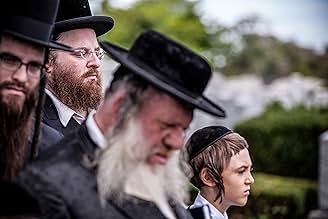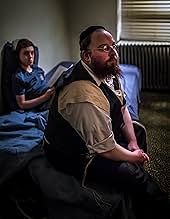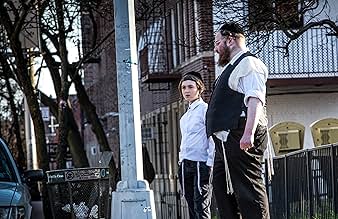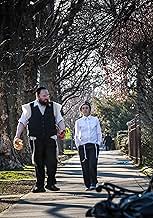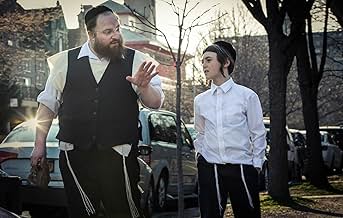VALUTAZIONE IMDb
6,6/10
2712
LA TUA VALUTAZIONE
Aggiungi una trama nella tua linguaWithin Brooklyn's ultra-orthodox Jewish community, a widower battles for custody of his son. A tender drama performed entirely in Yiddish, the film intimately explores the nature of faith an... Leggi tuttoWithin Brooklyn's ultra-orthodox Jewish community, a widower battles for custody of his son. A tender drama performed entirely in Yiddish, the film intimately explores the nature of faith and the price of parenthood.Within Brooklyn's ultra-orthodox Jewish community, a widower battles for custody of his son. A tender drama performed entirely in Yiddish, the film intimately explores the nature of faith and the price of parenthood.
- Regia
- Sceneggiatura
- Star
- Premi
- 7 vittorie e 18 candidature totali
Meir Ber Schwartz
- The Ruv
- (as Meyer Schwartz)
Melissa Weisz
- Bayla
- (voce)
Recensioni in evidenza
This movie causes tremendous anguish, okay Menashe can't be considered what we usually call a responsible adult, but the rules on fatherhood revolted me extremely, it hurt, to see the love for the child and the mandatory absence (no father and mother a child can't study) absurd... Slow, delicate, simple, a pure portrait of father/son love and Jewish traditions. Menashe's plot is loosely based on Lustig's life. In an interview with the Los Angeles Times, he said that "unlike Menashe in the movie, I'm not a schlimazel by nature. Maybe just a schlimazel by situation."
"Menashe" is a semi-documentary, reflecting the case of Menashe Lustig, the actor performed the main character. A film about laws of an ultra conservative community, about parenthood and about life. And , sure, about vulnerable people. Touching and delicate and precise, the work of Menashe Lustig is just admirable. He is the film and I admitt, I saw me reflected in his beautiful portrait of the single father , lost across the challenges, naive and man of good intentions, prisoner of his life. So, a gem . A real special one because it is not a lesson but a confession, honest at whole.
Struggle is something that is universal. Adversity doesn't care who you are, where you have come from, or even who you know. Granted, it can be relative, but no matter who you are, road blocks are still road blocks. Documentarian and first-time narrative director Joshua Z. Weinstein takes this theme but looks at it from a different direction with "Menashe," featured at this year's Dallas International Film Festival and now getting a wider release.
The title character is played by Menashe Lustig and is a widower who is just trying to get by in his ultra-orthodox Jewish community. He is still mourning the loss of his wife a year later while constantly chasing his bills working at a local Jewish market, and he is also dealing with the fact that he does not have custody of his son, Rieven (Ruben Nidorski) due to his religious beliefs that children must be raised in a two-parent household. Until he remarries, Rieven has to live with his brother, Eizik (Yoel Weisshaus), and his family. Menashe has always been seen as the lesser of his siblings, so he embarks on a journey of self-discovery and responsibility just to try for a normal life.
Weinstein takes his documentary-style of filming (with no score and a lot of steady-cam shots) and applies it here, which gives it an intimate feel that really enhanced my emotional investment into his story (which he also co-wrote with Alex Lipschultz). In my comments to our vendor after the screening, I used the phrase "both heartbreaking and heartwarming," and this is the best way I can describe "Menashe". Lustig plays the lead character in a way that even though his struggles are specific to a demographic, there are themes of independence, responsibility, and family that each and every one of us can identify with and feel for him during. His work with Nidorski is very organic, and it works on every level. Almost the entire film is translated from Yiddish, but as real and powerful as this story is, the subtitling bothered me even less than it normally does.
It is true that this film may not be seen as "for everyone" due to the community that it takes place in, but I fully and whole-heartedly disagree. Its universal themes are presented in a way that its context is well-explained so that the audience can see why the traditions are what they are. Much like "Donovan" earlier this year, "Menashe" is an independent film that tells its story in an honest and grounded way that deserves to be seen by as large of an audience as possible.
The title character is played by Menashe Lustig and is a widower who is just trying to get by in his ultra-orthodox Jewish community. He is still mourning the loss of his wife a year later while constantly chasing his bills working at a local Jewish market, and he is also dealing with the fact that he does not have custody of his son, Rieven (Ruben Nidorski) due to his religious beliefs that children must be raised in a two-parent household. Until he remarries, Rieven has to live with his brother, Eizik (Yoel Weisshaus), and his family. Menashe has always been seen as the lesser of his siblings, so he embarks on a journey of self-discovery and responsibility just to try for a normal life.
Weinstein takes his documentary-style of filming (with no score and a lot of steady-cam shots) and applies it here, which gives it an intimate feel that really enhanced my emotional investment into his story (which he also co-wrote with Alex Lipschultz). In my comments to our vendor after the screening, I used the phrase "both heartbreaking and heartwarming," and this is the best way I can describe "Menashe". Lustig plays the lead character in a way that even though his struggles are specific to a demographic, there are themes of independence, responsibility, and family that each and every one of us can identify with and feel for him during. His work with Nidorski is very organic, and it works on every level. Almost the entire film is translated from Yiddish, but as real and powerful as this story is, the subtitling bothered me even less than it normally does.
It is true that this film may not be seen as "for everyone" due to the community that it takes place in, but I fully and whole-heartedly disagree. Its universal themes are presented in a way that its context is well-explained so that the audience can see why the traditions are what they are. Much like "Donovan" earlier this year, "Menashe" is an independent film that tells its story in an honest and grounded way that deserves to be seen by as large of an audience as possible.
This particular genre is a bit like found footage horror: a lot of new film makers see it as an easy and affordable way of getting their foot in the door.
A restrained but curiously authentic feeling story that is not itself about Menashe getting remarried (as it is often advertized) but more about him dealing with the pressure to do so. There is something horribly feasible in the premise and the writing is naturalistic without ever becoming drab or dull. This is a story you can believe is happening right now in little communities all over the world and it tells this story without sensationalism or soap opera heaviness.
The narrative is fragmented into episodes of Menashe having fun with his son, doing his job and Jewish stuff. It's a serene and rather charming vision into the life of someone is really just a regular guy, he happens to just be part of a particular community he has no desire to subvert or part from, yet find himself victim to the values he has implicitly accepted.
The film is at its most charming when Menashe is with his son. The details of this brand of Judaism which Menashe tries uphold and pass down to him really make the movie memorable and touching while those very same values strive to keep them apart.
This will not be everyone's cup of tea: although nothing transgressive it will simply be too leisurely and uneventful for many people and this is indeed a movie where you just have to feel the moment: the prayers at a cemetery, picking a painting of a Rabbi etc. You may easily find it hard to stay awake or watch this in one sitting. But for what it is, it is pretty much note perfect and leaves you with a powerful sense of the quite desperation and helplessness that so many of us just have to live with.
There is a moment where I was holding my breath, you'll know it when you see it...
A restrained but curiously authentic feeling story that is not itself about Menashe getting remarried (as it is often advertized) but more about him dealing with the pressure to do so. There is something horribly feasible in the premise and the writing is naturalistic without ever becoming drab or dull. This is a story you can believe is happening right now in little communities all over the world and it tells this story without sensationalism or soap opera heaviness.
The narrative is fragmented into episodes of Menashe having fun with his son, doing his job and Jewish stuff. It's a serene and rather charming vision into the life of someone is really just a regular guy, he happens to just be part of a particular community he has no desire to subvert or part from, yet find himself victim to the values he has implicitly accepted.
The film is at its most charming when Menashe is with his son. The details of this brand of Judaism which Menashe tries uphold and pass down to him really make the movie memorable and touching while those very same values strive to keep them apart.
This will not be everyone's cup of tea: although nothing transgressive it will simply be too leisurely and uneventful for many people and this is indeed a movie where you just have to feel the moment: the prayers at a cemetery, picking a painting of a Rabbi etc. You may easily find it hard to stay awake or watch this in one sitting. But for what it is, it is pretty much note perfect and leaves you with a powerful sense of the quite desperation and helplessness that so many of us just have to live with.
There is a moment where I was holding my breath, you'll know it when you see it...
The price tag on fatherhood soars when tradition knocks on your door. Orthodoxy antagonizes the downtrodden, and fortune is monopolized by the most religious adherents. Yiddish mumbles separate father from son. Songs of lament ring through thin apartment walls. The rambunctious laughter of Menashe's child is limited to sidewalk engagements.
Employee of the month every month, Menashe is invaluable to his dictatorial boss at the borough's cultural specific grocery front. This distinction is not established by Menashe's work ethic, but rather by his attention to detail. With Hispanic co-workers, his Hasidic sensibilities garner favor with his Jewish supervisor. Menashe truly desires the best for the customers, and even if the man in charge cannot accommodate, the sentiment is appreciated with stern denials.
Approaching a year since the most bitter sweet loss of his self- contained life, Menashe is finally heeding his Rabbi's instructions, albeit halfheartedly. He submits to uncomfortable appointments in hopes of restoring a household. He is attempting to regain one person, by courting another.
His book speaks of man's inadequacy void of a woman. The Torah crafts a tale of interdependence, and his leadership point at passages to bolster his grief. The community cares for his son above him, and he cares for his son above all else. The walls of domesticity have tumbled, and he is the remaining survivor in Jericho.
A man cannot be expected to run a home and a livelihood, Menashe is reminded by his financially obese brother-in-law. The division in duties is divinely appointed, and Menashe's spiritual juggling can be blamed for his misfortune. His orthodoxy begins to slip. His coat and hat creep out of his closet, and he studies haphazardly.
What Menashe lacks in observance, he corrects with compassion. He is zealous but in an unconventional manner. He mimics his creator when he horses around with his only child. The abandon and whimsy of Menashe infects the boy, and together they create a fuller home than any other formal nuclear family. The uncompromising devotion to one's offspring might just rewrite thousands of years of tradition.
Employee of the month every month, Menashe is invaluable to his dictatorial boss at the borough's cultural specific grocery front. This distinction is not established by Menashe's work ethic, but rather by his attention to detail. With Hispanic co-workers, his Hasidic sensibilities garner favor with his Jewish supervisor. Menashe truly desires the best for the customers, and even if the man in charge cannot accommodate, the sentiment is appreciated with stern denials.
Approaching a year since the most bitter sweet loss of his self- contained life, Menashe is finally heeding his Rabbi's instructions, albeit halfheartedly. He submits to uncomfortable appointments in hopes of restoring a household. He is attempting to regain one person, by courting another.
His book speaks of man's inadequacy void of a woman. The Torah crafts a tale of interdependence, and his leadership point at passages to bolster his grief. The community cares for his son above him, and he cares for his son above all else. The walls of domesticity have tumbled, and he is the remaining survivor in Jericho.
A man cannot be expected to run a home and a livelihood, Menashe is reminded by his financially obese brother-in-law. The division in duties is divinely appointed, and Menashe's spiritual juggling can be blamed for his misfortune. His orthodoxy begins to slip. His coat and hat creep out of his closet, and he studies haphazardly.
What Menashe lacks in observance, he corrects with compassion. He is zealous but in an unconventional manner. He mimics his creator when he horses around with his only child. The abandon and whimsy of Menashe infects the boy, and together they create a fuller home than any other formal nuclear family. The uncompromising devotion to one's offspring might just rewrite thousands of years of tradition.
Lo sapevi?
- QuizDirector Joshua Z Weinstein, who is neither a member of a Haredi community nor a speaker of Yiddish, used a translator on set.
- Colonne sonoreIvdu Es Hashem Mit Simcha
Written and performed by Michoel Schnitzler
Courtesy of Michoel Schnitzler
I più visti
Accedi per valutare e creare un elenco di titoli salvati per ottenere consigli personalizzati
- How long is Menashe?Powered by Alexa
Dettagli
- Data di uscita
- Paesi di origine
- Sito ufficiale
- Lingue
- Celebre anche come
- 我和我的不完美老爸
- Luoghi delle riprese
- Aziende produttrici
- Vedi altri crediti dell’azienda su IMDbPro
Botteghino
- Lordo Stati Uniti e Canada
- 1.703.036 USD
- Fine settimana di apertura Stati Uniti e Canada
- 62.078 USD
- 30 lug 2017
- Lordo in tutto il mondo
- 1.962.265 USD
- Tempo di esecuzione
- 1h 22min(82 min)
- Colore
- Mix di suoni
- Proporzioni
- 2.00 : 1
Contribuisci a questa pagina
Suggerisci una modifica o aggiungi i contenuti mancanti





